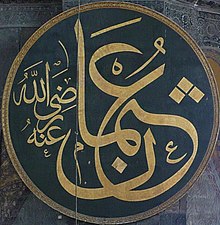Our website is made possible by displaying online advertisements to our visitors.
Please consider supporting us by disabling your ad blocker.
Uthman
| Uthman عُثْمَان | |
|---|---|
 Calligraphic seal featuring Uthman's name, on display in the Hagia Sophia, Istanbul | |
| 3rd caliph of the Rashidun Caliphate | |
| Reign | 6 November 644 – 17 June 656 |
| Predecessor | Umar |
| Successor | Ali |
| Born | c. 576 Hejaz, Arabia |
| Died | 17 June 656 (aged 80) (12[1][2]/18 Dhu al-Hijjah 35 AH)[3][4] Medina, Hejaz, Rashidun Caliphate |
| Burial | Jannat al-Baqi, Medina |
| Spouse |
|
| Issue (among others) | |
| Tribe | Quraysh (Banu Umayya) |
| Father | Affan ibn Abi al-As |
| Mother | Arwa bint Kurayz |
| Religion | Islam |
| Uthman The Generous (al-Ghani) |
|---|
 |
| Part of a series on Sunni Islam |
|---|
 |
|
|
Uthman ibn Affan (Arabic: عُثْمَان بْن عَفَّان, romanized: ʿUthmān ibn ʿAffān; c. 573 or 576 – 17 June 656) was the third caliph, ruling from 644 until his assassination in 656. Uthman, a second cousin, son-in-law, and notable companion of the Islamic Prophet Muhammad, played a major role in early Islamic history. During his reign as caliph, he was known for ordering the official compilation of the standardized version of the Quran that is still being used today.
Before his predecessor, Caliph Umar (r. 634–644), died in office, he appointed a committee of trustees to elect a successor. Uthman, who was then aged 68–71 years, was elected to succeed him and became the oldest person to hold such a high position. During his premiership, the Caliphate expanded further into Persia in 650 and reached as far as the provinces of Khorasan in 651. Uthman instituted centralized reforms in order to create a more cohesive administrative structure and fostered rapid economic growth.
However, the last years of his reign were marked by discontent that eventually evolved into an armed revolt, leading to a siege upon his residence and ultimately culminating in his assassination. Sunni Muslim tradition considers him the third rightly-guided caliph.
- ^ Musannaf Ibn Abi Shaybah vol. 13, pg 388, no. 38727, status of naration: Sahih.
- ^ Muhammad, Muhammad Hamid (7 May 2018). سيرة ومناقب عثمان بن عفان. Dar al-Taqwa. ISBN 9789776603585.
استشهد في أوسط أيام التشريق (12 ذي الحجة) لصحة نقله عن أبي عثمان النهدي، المعاصر للحادثة. وما سواه من أقوال لم يصح إسناد شيء منها، وكل ما جاء به من أسانيد فهي ضعيفة، وبعض منها صدر ممن لم يعاصر الحادثة. [He was martyred in the middle of the days of Tashreeq, because it was reported by Abu Uthman Al-Nahdi, a contemporary of the incident. As for other sayings, none of them are authentic, and all the chain of narrators that scholars brought are weak, and some of them were issued by those who did not contemporary with the incident.]
[permanent dead link] - ^ [R. Stephen Humphreys (transl.), The History of al-Tabari: Volume XV. The Crisis of the Early Caliphate, (New York: State University of New York Press, 1990), pp. 250–251.]
- ^ Wilferd Madelung, The Succession to Muhammad: A Study of the Early Caliphate (Cambridge: Cambridge University Press, 1997), p. 135.
Previous Page Next Page


